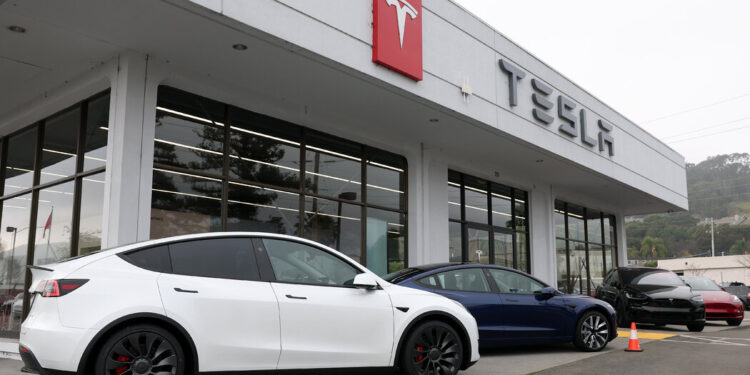Elon Musk, the chief executive of Tesla, has long tried to crack into the Indian automobile market and has confronted trade barriers that made that hard to do.
Now, when Mr. Musk holds a position of power in the U.S. government as an aide to President Trump, there are signs that Tesla is making preparations to start selling electric cars in India.
Tesla formed a local subsidiary in 2021 and established a relationship with India’s prime minister, Narendra Modi, a decade ago. The company has neither a manufacturing facility nor a concerted sales operation and has sold only a small number of cars in India.
But President Trump has made the sale of American cars in India a U.S. priority and is pushing Mr. Modi to loosen India’s trade barriers on auto imports.
Mr. Musk met with Mr. Modi this month when the prime minister was in Washington for bilateral meetings with Mr. Trump.
Three business people familiar with the real estate markets in New Delhi and Mumbai, two of whom spoke on the condition of anonymity, said Tesla was pursuing leases for large commercial spaces in both cities.
Tesla has posted listings for a variety of jobs in Mumbai, some of them with descriptions that involve work in New Delhi as well. The roster of positions, including service managers, operations analysts and salespeople, suggests that the company is planning to open showrooms. One of the new hires in India, the Tesla site said, will “engage walk-in guests promptly, personally and with the goal of opening the conversation and ensuring they feel welcome.”
News that Tesla was prospecting for commercial real estate was reported earlier by Reuters.
Mr. Modi’s meeting with Mr. Musk came on Feb. 13, when the Indian leader was in Washington to visit with President Trump. “I assume he wants to do business in India,” Mr. Trump said about the Musk-Modi meeting. India’s official statement was that they “discussed strengthening collaboration between Indian and U.S. entities in innovation, space exploration, artificial intelligence, and sustainable development.”
India’s total tariff on fully assembled electric vehicles stands at 110 percent. Mr. Musk took note of India’s trade policy when interviewed on Fox News this week along with Mr. Trump: “The tariffs are, like, 100 percent import duty.”
The Economic Times, an Indian newspaper, reported on Thursday that the rate could be cut to 15 percent by an upcoming change in government policy, for any company that commits $500 million to production in India. But the lower rate would only apply to 8,000 units a year; any more would be taxed at the higher rate.
Even if import barriers vanished, Tesla would have a tough time breaking into India. Local manufacturers like Mahindra and Tata are producing popular electric cars that retail for just under $15,000. Teslas start at around $40,000. And there is no Supercharger network in India. Those charging stations have helped drive demand for Teslas on American highways.
Vinkesh Gulati, a longtime executive in the Indian auto industry, said Tesla was “scouting for talent and showrooms in India.” He said he believed that the company was eager to show the Indian government that it was interested in entering the market. He said, however, that Tesla would probably push to raise or eliminate the planned 8,000-per-year limit for low-tariff imports.
Mr. Musk has shown an interest in India for years. “I am fan of Modi,” he said at a news conference in 2023. Early last year, he said on X that India deserved a permanent seat on the U.N. Security Council. Two months later, Mr. Modi’s government said it would reduce tariffs on exporters like Tesla — provided they build factories in India — and Mr. Musk said he would visit Mr. Modi in New Delhi. But the trip was canceled and no factory was built.
Tesla purchases a relatively small amount of parts for its vehicles from Indian suppliers. The company sourced $1 billion from India in 2023, according to government data.
Mr. Musk’s internet satellite service, Starlink, which is also hoping for favorable policy changes in India, looks like a much bigger opportunity for coordination between the world’s richest tycoon and its most populous nation.







